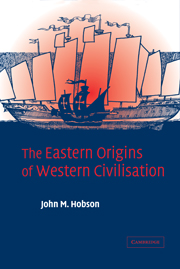Book contents
- Frontmatter
- Contents
- List of tables
- Preface and acknowledgements
- Map: Hobo-Dyer projection of the world
- 1 Countering the Eurocentric myth of the pristine West: discovering the oriental West
- I The East as an early developer: the East discovers and leads the world through oriental globalisation, 500–1800
- II The West was last: oriental globalisation and the invention of Christendom, 500–1498
- III The West as a late developer and the advantages of backwardness: oriental globalisation and the reconstruction of Western Europe as the advanced West, 1492–1850
- IV Conclusion: the oriental West versus the Eurocentric myth of the West
- 12 The twin myths of the rational Western liberal-democratic state and the great divide between East and West, 1500–1900
- 13 The rise of the oriental West: identity/agency, global structure and contingency
- Notes
- Index
12 - The twin myths of the rational Western liberal-democratic state and the great divide between East and West, 1500–1900
Published online by Cambridge University Press: 22 September 2009
- Frontmatter
- Contents
- List of tables
- Preface and acknowledgements
- Map: Hobo-Dyer projection of the world
- 1 Countering the Eurocentric myth of the pristine West: discovering the oriental West
- I The East as an early developer: the East discovers and leads the world through oriental globalisation, 500–1800
- II The West was last: oriental globalisation and the invention of Christendom, 500–1498
- III The West as a late developer and the advantages of backwardness: oriental globalisation and the reconstruction of Western Europe as the advanced West, 1492–1850
- IV Conclusion: the oriental West versus the Eurocentric myth of the West
- 12 The twin myths of the rational Western liberal-democratic state and the great divide between East and West, 1500–1900
- 13 The rise of the oriental West: identity/agency, global structure and contingency
- Notes
- Index
Summary
He who knows himself and other,
Will also recognise that East and
West cannot be separated.
GoetheAs we have seen throughout this book, Eurocentrism posits a strict dividing line between the East and West. This serves to represent the East and West as not only separate but qualitatively different (in a developmental sense, that is). More importantly, as we noted in ch. 1, within the Eurocentric discourse this divide implies a kind of intellectual apartheid regime in which the superior West is quarantined off from the inferior East. The East is allegedly permeated by despotic and irrational institutions that block economic progress. The linchpin of this claim lies in the theory of oriental despotism (or what Max Weber called ‘patrimonialism’). Conversely, the presence of rational and liberal states in Europe ensured that only the West was capable of progressive economic development. Part 1 of this book argued that the theory of oriental despotism is a fabrication and obscures both the presence of relatively rational Eastern states on the one hand, and significant economic progress in the East on the other. But the task remains to consider the degree to which the Western state was as rational as Eurocentrism has presupposed. To evaluate this claim I shall focus on three aspects of the ‘rational state’:
a ‘rational-legal’ centralised bureaucracy which operates according to impersonal (rather than arbitrary) norms and presupposes a clear separation of the public and private realms;
a ‘minimalist’ or laissez-faire posture in relation to the economy (i.e. where the state does not interfere in the ‘natural’ operation of the free market). […]
- Type
- Chapter
- Information
- The Eastern Origins of Western Civilisation , pp. 283 - 293Publisher: Cambridge University PressPrint publication year: 2004



